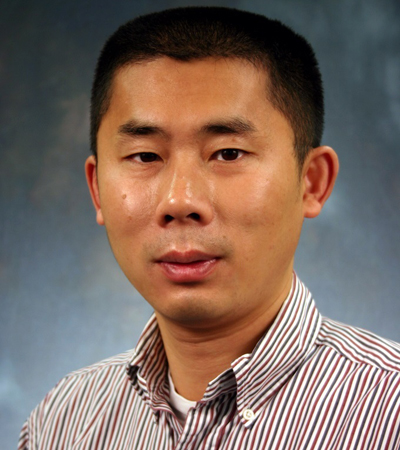MPower Professor Profile: Yihua Bruce Yu, PhD
October 05, 2022 Communications
School of Pharmacy professor was selected for his commitment to interdisciplinary and interprofessional collaboration.
In November 2021, University of Maryland, College Park President Darryll J. Pines, PhD, and University of Maryland, Baltimore President Bruce E. Jarrell, MD, FACS, named eight professors as the inaugural MPower Professors. This award from the University of Maryland Strategic Partnership: MPowering the State (MPower) recognizes, incentivizes, and fosters faculty collaborations between the College Park and Baltimore campuses.
Selected for his commitment to interdisciplinary and interprofessional collaboration, Yihua Bruce Yu, PhD, professor of pharmaceutical sciences, University of Maryland School of Pharmacy (UMSOP), is also director of the Bio- and Nano-Technology Center at UMSOP. Yu’s expertise is in biophysics and bioengineering. In 2019, Yu joined the Institute for Bioscience and Biotechnology Research in Rockville, Md., a joint research institute between the University of Maryland and the National Institute for Standards and Technology (NIST). His lab advances the development of analytical technologies for characterizing complex drugs and vaccines. He holds multiple patents, including noninvasive analytical technologies for biologics production and inspection. In 2005, he received a U.S. Presidential Early Career Award for Scientists and Engineers.
Can you briefly describe the type of research you do?
We develop noninvasive analytical technologies for quality control of biomanufacturing and biologics, such as vaccines, and therapeutic proteins — like insulin and HUMIRA — gene and cell therapy products, and others.
Vaccines and therapeutic proteins are fragile and could be damaged during distribution and storage. Currently, there's no quality control mechanism at the point-of-care other than visual inspection. However, the damage is not always visible to the human eye. Our technology — water proton nuclear magnetic resonance (wNMR) — collects data on individual vials or syringes of vaccines or drugs, as long as they are formulated as liquid dosage forms (solutions, emulsions, and suspensions) with water as the solvent. The data of each individual vial/syringe can rapidly provide an indicator of its quality.
We currently make measurements in our lab, using benchtop instruments. We also collaborate with the pharmaceutical and biotech industry. In such collaborations, we collect data using wNMR and our collaborators collect data using conventional technologies. We then compare notes with them.
What drives you to do this research?
We want to improve the efficiency of biomanufacturing and strengthen the quality control of biologics. We hope to eventually enable health care providers and patients to check on the quality of vaccines and therapeutic proteins before injection using our technology. This may enhance public confidence in vaccines and drugs and prevent certain adverse reactions.